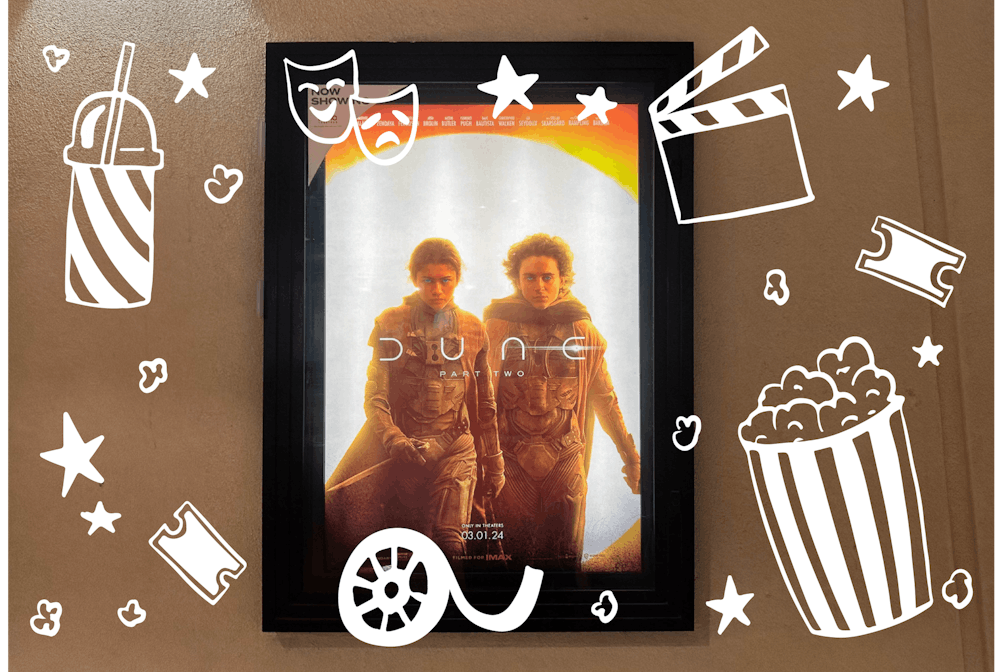"Dune: Part Two" tells stories of worlds both real and fictional in its plot marked with politics, prophecy and power — and it may have set a new standard in sci-fi along the way.
The 2024 film released to massive acclaim, grossing nearly $180 million worldwide in just its first weekend at the box office and garnering high fan and critical praise.
The movie, based on the 1965 Frank Herbert sci-fi novel, tells the story of Paul Atreides and his rise to power as the supposed messiah of the Fremen, the indigenous people of the planet Arrakis. Unlike its prequel, the movie "Dune: Part Two", which covers the later part of the novel, tells a more sinister tale as Paul Atreides loses his humanity in the name of power.
"It's really tragic, honestly," said Jacob Shannon, a junior studying film and media production. "Given the first (film), you liked Paul, you really liked him. But you're seeing what’s happening, and it almost feels inevitable, and there's nothing you can do about it."
Whether one interprets it as Paul becoming an antihero or a true villain, the stylistic and tone changes are clear as he is pressured into his role as the Lisan al Gaib (or the planted prophet) of the Fremen.
Fans lauded the filmmaking, stylistic choices and overall decisions of director Denis Villeneuve, as well as the leading performance from Timothée Chalamet (Paul Atreides).
"The look of the film was just beautiful – some great cinematography, also a very good score," Ian Marcon, a sophomore studying biomedical engineering, said.
But despite the fluff and the blockbuster qualities, what makes the film unique and timeless — just like the book — is its intent and messaging.
"It's kind of deconstructing a power fantasy about what it means to be superhuman," said Toby Harper, an associate professor at the School of Historical, Philosophical and Religious Studies and panelist for the upcoming ASU event 'Desert Power': Religion and History in Dune. "The more power (Paul Atreides) acquires, the more trapped he is. It doesn't get him what he wants."
The film contains messaging that's at times on-the-nose, but not always, leading audiences to a variety of interpretations.
"It just made me think about these large narratives that can become ingrained in a society, and the exploitation of that is what allowed (Paul Atreides') ascension,” said Isaac Hammon, a junior studying film and media production. "(Frank Herbert) was making a commentary on the worshiping of heroes and elevating individuals to a place where they have absolute power."
Through these timeless messages, "Dune: Part Two" can become even more relevant as the years pass, especially with fans' lack of satisfaction with recent sci-fi content on the big screen. Franchises like Star Wars and The Lord of the Rings have produced some quality content in the last few years, but not much that satisfies the expectations of true sci-fi fans.
READ MORE: Disney's 'Ahsoka' toes the line between fan service and cash grab
"Having this movie that’s just extraordinary kind of reinvigorated the landscape of sci-fi movies," Marcon said. "Compared to the three Star Wars movies, I think (the Dune movies) are just way above them."
But the main takeaway of "Dune: Part Two" for many is how it relates to the real world now, not just other fictitious universes.
A clear parallel is through modern conflict and political struggle, much like the allegory made by the original Star Wars movies to American imperialism and the Vietnam War. As a matter of fact, many sci-fi fans have speculated that Star Wars was directly inspired by the novel "Dune".
"This idea of power constraint is really important in the United States because the United States is a superpower," Harper said. "It's a reminder of the constraints that power brings: once you're involved everywhere, the problems everywhere come back to haunt you. Just because you're the most powerful doesn't give you complete agency. Actually, power creates obligations."
Fans also find that the movie's story parallels the platform and sometimes unconditional love given to celebrities.
"I'm looking at the cast and I'm like, 'these guys, their real life is the closest to Paul (Atriedes) that we're going to see,'" Hammon said. "They've been blessed with, obviously, extraordinary talents. We elevate them to social and political status, and what they say carries so much weight because we pour so much love into them."
The irony here is clear, with red carpets, endless praise and millions of dollars for big names involved in the franchise, much like the system the plot critiques, but the message of the film remains relevant.
Blurring the lines between good and evil and hero and villain feels abnormal in the realm of blockbuster movies. The complex plot of "Dune: Part Two" is an escape from the all-too-common hero's journey in sci-fi storytelling.
This allows for a nuanced and realistic mirror for people to look in and see themselves, the world or whatever they can take from it.
"There doesn't have to be a disconnect between indie arthouse filmmaking, which is trying to say really poignant things on the human experience, and blockbuster movies, which are just visually spectacular," Hammon said. "We can do both of those at the same time."
Edited by Sophia Braccio, Sadie Buggle and Caera Learmonth.
Reach the reporter at adirst@asu.edu and follow @andrewdirst on X.
Like The State Press on Facebook and follow @statepress on X.
Andrew is a senior studying journalism and mass communication. This is his fourth semester with The State Press. He has also worked at The Arizona Republic and Cronkite News.




